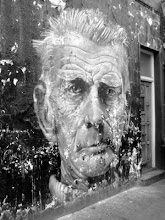I was recently asked by a friend of mine if I could recommend some creative writing courses and since being made redundant a couple of weeks ago I’ve finally found time to do it. I post them here as they may be of some use to those of you quivering to pen the Great British Novel:
Despite Hanif Kureishi's possibly highly accurate contention that creative writing courses are the 'new mental hospitals', I've compiled the following list of those that I rate. Right, here goes:
1. The Faber Academy
For those who want to really take their writing seriously, this is the place to go. Where else can you be tutored by John Sutherland in the subtle art of memoir writing, coached by Marcel Theroux and Erica Wagner on the strategy of writing or be instructed by Tracey Chevalier on the ticklish issues that come with writing historical fiction? All in all Faber offers perhaps the highest level of targeted course-based CW education. Not cheap, of course, but feel that quality.
http://www.faberacademy.co.uk/?gclid=CJjmq_fC3Z0CFVtm4wodIHGrOA
2. The Arvon Foundation
Arvon, as it is popularly known, offers residential creative writing courses in locations from Yorkshire to Devon, Shropshire to Inverness-shire. Like Faber they cover all aspects of creative writing from poetry to screen-plays, novels to short stories and attract a fine and established cadre of published, successful writers to tutor. Indeed if success can be measured by the number of students who have gone on to be published then Arvon is impressive indeed.
http://www.arvonfoundation.org/p3.html
3. West Dean College
Set in beautiful surroundings in Chichester, West Sussex, WDC runs a number of CW short courses which are tutored by two successful writers, wife and husband team Kate and Greg Mosse. Greg is something of a peripatetic CW tutor and also runs courses through the SouthBank Centre. Kate has written two bestsellers as well as being one of the founding mothers of the Orange prize. Needless to say they both know what they're talking about. They are currently running a competition giving the winner the opportunity to write undisturbed in the rather luxurious surroundings. I’m entering, why don’t you? Good luck!
https://www.westdean.org.uk/CollegeChannel/ShortCourses/Courses/CreativeWriting.aspx
4. Ty Newydd
Ty Newydd is the national writers’ centre of Wales and is set in an inspiring wooded location with views over Cardigan Bay. They attract tutors of the calibre of Patrick Gale and Tiffany Murray both of whom are fine writers and damn fine teachers. That they can also attract Kevin Crossley-Holland tutoring on myth, Horatio Clare on life writing and Carol Anne Duffy on poetry gives you an idea of just how good they are. They also have a lovely pay-by-instalment plan for the more impecunious author-to-be.
http://www.tynewydd.org/english/home.html
5. The London School of Journalism
Although unsurprisingly focussed on mainstream journalism courses there is a very good short CW course tutored by Andrew Taylor which covers the basic building blocks of writing creatively. The next of these three-day courses is due to run in March 2010.
http://www.short-courses.co.uk/creative.php
6. The Open College of the Arts
An educational charity devoted to the arts, the OCA runs a number of rather good correspondence courses that encompass basic beginner themes to more advanced material for those who wish to hone already practiced skills. Each of the courses is 12 months long and requires some 8 hours per week of study.
http://www.oca-uk.com/distance-learning/writing-3-advanced
7. University of East Anglia
The Ur-course of creative writing and still the most highly regarded. For those who want to do it properly then nowhere can be better than here. Since it's founding in 1970-71 by Angus Wilson and Malcolm Bradbury this MA course has seen a hugely impressive list of former alumni go on to be the bestselling, award-winning writers of at least two generations; Ian McEwan, Kazuo Ishiguro, Anne Enright, Tash Aw, Richard Beard, Andrew Cowan, Joe Dunthorne, Andrew Miller, Owen Sheers, Tracy Chevalier, Trezza Azzopardi, Panos Karnezis, Suzannah Dunn and Susan Elderkin to name but... well, you get the point.
http://www.uea.ac.uk/creativewriting
8. The Writers' Workshop
Run by writers for writers the WW offers a fairly wide range of courses in London, Manchester, Glasgow and Oxford and covering the intro courses for complete beginners to seriously advanced stylistic stuff for the seasoned pro. They have one of the best teams of editors who between them have been responsible for winning damn near every award going.
http://www.writersworkshop.co.uk/staff.shtml
Happy writing.
Yours,
LibraDoodle.



